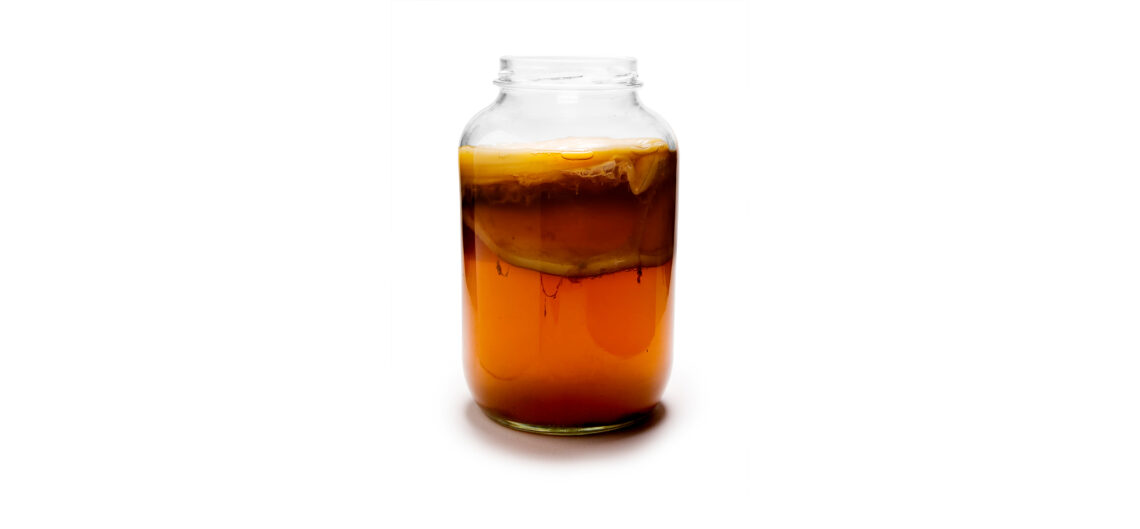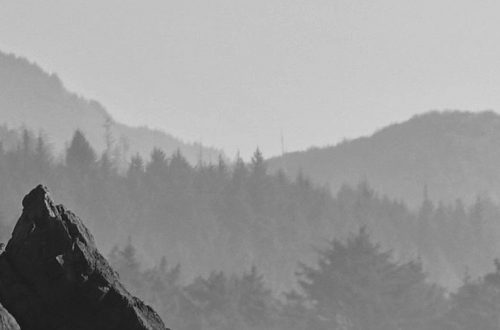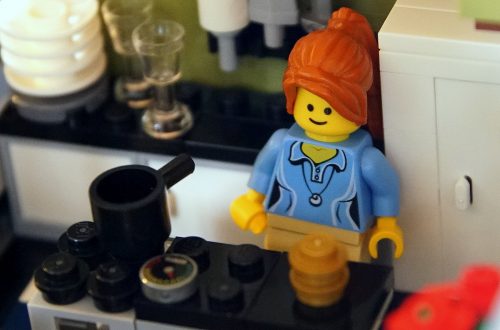by Emily Lehman
When I heard Anne Lamott say that “laughter is carbonated holiness,” I stamped the phrase out laboriously with a label maker and affixed it to the outside of my kombucha jar.
Kombucha is about waiting. Making kombucha properly requires setting up the culture, then forgetting about it in a dark corner somewhere. After you have forgotten your kombucha for a month or so, you will have to take it back out and attend to it carefully because it needs to be fed with sweet things to fizz. Chopping up a pear or an apple works fine for this. You put the kombucha into a capped bottle with the fruit and leave it for two or three days in the same dark place, but this time you must not forget it because if you don’t let the gas out every day or two the bottle may explode. It is carbonating.
Among my other forays into springtime growth this year was a tray of seedlings in a sunny south-facing window. Seedlings, unlike kombucha, require an almost frenetic attention, because if (like I did) you plant them in raised bed soil instead of seedling soil they will dry out overnight and flop dramatically, only to be revived again by the afternoon—if you notice them. Houseplants, similar to and yet different from seedlings, find various places along a spectrum of wanting to be attended to and wanting to be ignored at any given time. If you mix up the two they will become annoyed, like children, or any people for that matter.
It’s a risky business forgetting about your kombucha in a dark corner or your succulent on a high shelf. But it’s also a risky business remembering, as anyone who has overwatered a plant to death will tell you. When you are watering a plant, you have to keep a Richard Wilbur-esque “difficult balance” between remembering and forgetting.
Just as you do with grief. Grief is among those things that either grow or fester. If you remember it all the time, it will be unbearable, and you will get spiritual root-rot. But if you forget it all the time, some part of you will be wasting away, even if you tell yourself you do not see it. Perhaps you will even be startled one day when something inside you explodes, like a row of forgotten bottles in the back of the pantry. You must wait, but carefully and with attention, if you want your pain to carbonate properly.
In Oh, the Places You’ll Go, Dr. Seuss describes “The Waiting Place.” In The Waiting Place,
Everyone is just waiting.
Waiting for the fish to bite
or waiting for wind to fly a kite
or waiting around for Friday night
or waiting, perhaps, for their Uncle Jake
or a pot to boil, or a Better Break
or a string of pearls, or a pair of pants
or a wig with curls, or Another Chance.
Everyone is just waiting.
Dr. Seuss calls The Waiting Place “a most useless place.” “NO! That’s not for you!” he cries. The Waiting Place is the festering and rotting of waiting gone wrong—just waiting around, waiting for Godot, waiting for nothing.
The waiting that you do while kombucha is carbonating, though, is a very different sort of waiting. It is real waiting—you are not waiting for a Better Break or Another Chance, you are waiting for the fizzy little bubbles that will make your kombucha more fun. This sort of waiting is a relief from abstract, vague waiting. You are waiting for something real. You are not “waiting around.” If you have started a kombucha jar in the corner of your kitchen, your life is fizzy with potentiality. You started something. Whether or not it comes to fruition is entirely beside the point. Your life has promise—it’s a pretty modest promise, to be sure, but it’s a promise. This is the antidote to aimless waiting.
Nowadays in our own version of The Waiting Place, we spend more time waiting around, and less time actively waiting for plants and animals, for the change of seasons, for cultures to grow and things to flourish. But we can change this. Throwing together a sourdough starter or a tray of seedlings is fairly easy. If you have a tray of seedlings, you have something to wait for. If you have a small cat, or a small dog, or a mouse or a rat or a snake or a hamster or a fish, you have something even better: something is waiting for you while you are also waiting for it to grow and flourish and live. There is someone in your house to whom it will matter that you are not at home. The knowledge of this waiting will follow you all over town, like a thread.
If you are waiting for a few things—say, a tray of seedlings and a batch of sourdough starter and muscle to build and grief to heal—I think that it makes the beginnings of a rich life. When you leave home, you know that if you were taken to Heaven this very afternoon, it would of course be wonderful for you, but your sourdough starter would spoil, your hamster would go unfed, and weeds would take over the back garden. And somehow this odd reluctance feels like a good thing—to care about the things of the world, to be called by love to the things of this world—I think because being in Heaven will require the same attention you used to pay to the hamster and the sourdough starter. “Attention, taken to its highest degree, is the same thing as prayer,” Simone Weil reflects. “It presupposes faith and love.”
It takes courage, attention and love to get on in the world, as well as waiting. Dr. Seuss knows it as well as any:
So be sure when you step.
Step with care and great tact
and remember that Life’s
a Great Balancing Act.
An article like this, about the time it takes to make kombucha and grow carrots in your back garden and make your thin cat fatter and your fat cat thinner, tends to be about patience. But I am not talking about patience here. I’m talking about “a Great Balancing Act” of remembering and forgetting, or paying attention and not paying attention, or seeing and not seeing. Waiting seems to be about forgetting you were waiting and then remembering you are waiting. Maybe that is patience. I don’t know. But it does seem that the way that plants and animals and cultures thrive is in brief bursts of vivid attention. If Simone Weil is right and “attention is the rarest and purest form of generosity,” then perhaps this is also true of people.
My sourdough starter and my animals and the basil bush I bought too early in the spring have insisted that I learn from them the slow-fast time of attending and not attending, and now time strangely expands—compounded not of deadlines and achievements, but of slow mellowing. Waiting-things remind us of all the old cliches—that good things take time, that emotions are temporary, that this too shall pass—but they remind us in a way that makes it possible to really hear the message. They will not be rushed. They insist, unlike most activities in today’s world, on being given exactly the time that they need.
Perhaps this is what Anne Lamott meant by “carbonated holiness.” Maybe what we can learn from carrots and cats and sourdough starter is a lesson in thinking about ourselves and then forgetting about ourselves—treating ourselves like another one of those things that grow. In the best-case scenario, grief carbonates into holiness and laughter, and we are the blessed among those who mourn.

Emily is a PhD candidate for Theology, the Imagination, and the Arts at the University of St Andrews in Scotland. When not writing about Shakespeare, Dostoevsky and Alasdair MacIntyre, she enjoys long walks, sitting on the floor at parties, cat ownership, and a shameless Taylor Swift obsession.
Header Image: “Mature Kombucha,” by Mgarten at the English Wikipedia, CC BY-SA 3.0





One Comment
Henry Lewis
Nicely written. I enjoy the reoccurring of finding balance in all things. In the commonplace and the divine. It’s all good, all the time. Waiting can be so hard, but you’ve given us a fresh window from which to look out as we – wait. Thanks again.